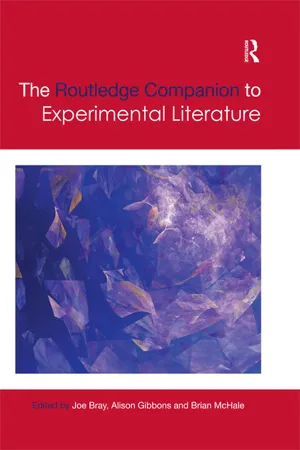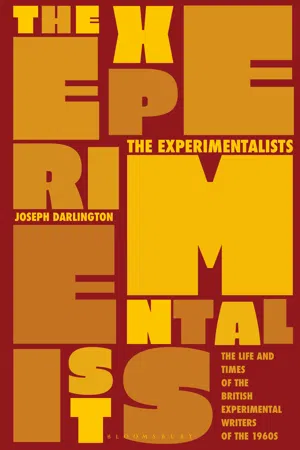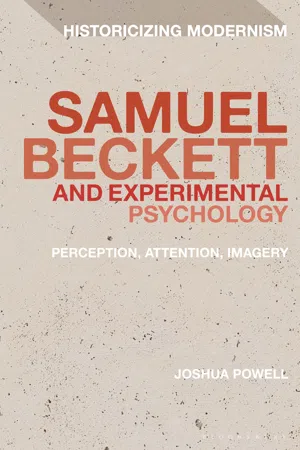Experimental Fiction
Experimental fiction is a literary genre that pushes the boundaries of traditional storytelling by employing unconventional narrative techniques, structures, and styles. It often challenges readers' expectations and perceptions of fiction, incorporating elements such as non-linear plots, fragmented narratives, and unconventional language use. Experimental fiction aims to explore new ways of storytelling and engage readers in thought-provoking and innovative ways.
7 Key excerpts on "Experimental Fiction"
- Joe Bray, Alison Gibbons, Brian McHale, Joe Bray, Alison Gibbons, Brian McHale(Authors)
- 2012(Publication Date)
- Routledge(Publisher)
...1 Introduction Joe Bray, Alison Gibbons and Brian McHale DOI: 10.4324/9780203116968-1 I What is experimental literature? Experimental literature, as the contents of this Routledge Companion amply testify, is irreducibly diverse. Unfettered improvisation and the rigorous application of rules, accidental composition and hyper-rational design, free invention and obsessively faithful duplication, extreme conceptualism and extreme materiality, multimediality and media-specificity, being “born digital” and being hand-made – all of these, and many others, are ways of being experimental in literature. Despite this diversity, however, a number of common threads (some of which will be explored below) traverse experimental literary practice across the twentieth century and right up to the present. The one feature that all literary experiments share is their commitment to raising fundamental questions about the very nature and being of verbal art itself. What is literature, and what could it be? What are its functions, it limitations, its possibilities? These are the sorts of questions that “mainstream” literature, at all periods – commercial bestseller literature, but also the “classics” once they have been canonized, domesticated and rendered fit for unreflective consumption – is dedicated to repressing. Experimental literature unrepresses these fundamental questions, and in doing so it lays everything open to challenge, reconceptualization and reconfiguration. Experimentation makes alternatives visible and conceivable, and some of these alternatives become the foundations for future developments, whole new ways of writing, some of which eventually filter into the mainstream itself...
- eBook - ePub
The Experimentalists
The Life and Times of the British Experimental Writers of the 1960s
- Joseph Darlington(Author)
- 2021(Publication Date)
- Bloomsbury Academic(Publisher)
...3 1964 to 1965 The scientific 1960s There is a question hanging over us which has so far gone unanswered. What exactly is so ‘experimental’ about experimental writing? The question is one that each writer dealt with in their own way. Many spurned the label as meaningless, while some embraced it in the hope that their own definition of the term might explain something of their writing and their philosophical intentions. The term, as it was applied at the time, refers broadly to literature that breaks from the traditional forms first laid down in the eighteenth century and then perfected in the nineteenth. As we have also seen, such a distinction is as much about the writers’ attitudes to each other as it is about the texts themselves. Some neo-Victorians, like Kingsley Amis for example, offer considerable stylistic innovations while remaining committed to traditional novel form, while arch-experimentalist B. S. Johnson nevertheless retains an eye for character and plot throughout his writing career. 1 The conflict between tradition and experiment is one driven by the writers’ attitudes and the critics’ desire to contrast and categorize. When it came to anything unusual, ‘experimental’ was the critic’s preferred descriptor. 2 Earlier eras have adopted similar terms. In the modernist period, critics preferred the military descriptor avant-garde, the forward guard who would seize new territories in advance of the main body of troops. The nineteenth century saw the racial category ‘bohemian’ serve a similar function, although it was more often used to describe alternative lifestyles than alternative literary styles...
- eBook - ePub
Samuel Beckett and Experimental Psychology
Perception, Attention, Imagery
- Joshua Powell(Author)
- 2020(Publication Date)
- Bloomsbury Academic(Publisher)
...The terms ‘avant-garde’, ‘experimental’ and ‘innovative’ are amalgamated into the single term ‘experimental’. This term, it is hoped, will be instilled with ‘connotations of edginess, renovation and aesthetic adventure’ (3). In this context, experimental literature can be ‘irreducibly diverse’ (1). A literary experiment merely has to ask the ontological questions that mainstream literature is ‘dedicated to repressing’: ‘What is literature and what could it be? What are its functions its limitations its possibilities’ (1)? This study will set itself up in opposition to this broad definition of experimental literature. Some very interesting insights may come from the amalgamation of the terms ‘avant-garde’, ‘innovative’ and ‘experimental’ within a broad volume such as the Routledge Companion. But I think it is important that the terms do not lose their particularity. The editors point out that ‘aesthetic avant-gardism continues to be allied with political radicalism in a number of twentieth- and twenty-first-century artistic and literary movements’ (1–2). If these movements are allied more with ‘political radicalism’ than with scientific experimentation, why label them ‘experimental’ and not ‘avant-garde’? Similarly, it will be my contention that twentieth-century literature had a relationship with scientific experimentation that went beyond the contest for cultural privilege. Rather than the all-encompassing version of experimental literature put forward in the Routledge Companion, I will identify a more limited tradition of literary experimentation. The editors of the Routledge Companion make a distinction between the scientific experiment’s promise to ‘extend the boundaries of knowledge’ and the literary experiment’s promise to extend the boundaries of ‘artistic practice’...
- eBook - ePub
Experiments in Life-Writing
Intersections of Auto/Biography and Fiction
- Lucia Boldrini, Julia Novak, Lucia Boldrini, Julia Novak(Authors)
- 2017(Publication Date)
- Palgrave Macmillan(Publisher)
...On the one hand, they may consist in conspicuous layout and typographical choices, as for example in Will Slocombe’s montage poem “Another’s Pleasure” or Galloway’s use of differently sized letters to indicate volume and emotional intensity in Clara. On the other hand, there are covert intermedial experiments that affect the verbal text indirectly. 78 Alhambra Díaz’s chapter on Marías’s Dark Back of Time sheds light on the ways in which an initial reference to a film that the protagonist sees induces a reading of Dark Back of Time that conceives the novel’s loose, metaleptic structure as an echo of that of the film. The Chapters in This Book The contributions to this collection examine experiments in life-writing whose departure from conventional generic modes is shown to have heuristic value. Long ago, Virginia Woolf postulated biography’s dependence on techniques associated with fiction to fulfil its purpose of bringing a character to life, 79 and it is certainly no coincidence that most authors studied here are experimental writers in other genres too and often already were before they turned to life-writing. However, the contributions in this volume reach beyond the pan-fictional view of life-writing implied in Woolf’s statement. Drawing on the tools and techniques of other genres does not automatically render a life-writing text experimental, after all. Rather, the texts studied here can be considered innovative in auto/biographical as well as in general literary terms. Overall, this volume covers several national literatures (British, Spanish, Italian, Austrian) and a broad spectrum of life-writing genres...
- eBook - ePub
Literature and Understanding
The Value of a Close Reading of Literary Texts
- Jon Phelan(Author)
- 2020(Publication Date)
- Routledge(Publisher)
...Literary fiction, as a sub-genre of literature and of fiction, entails that literary fiction stands in a different relation to fiction than genres such as romance or crime. One further implication is that cognitivist, anti-cognitivist and non-cognitivist arguments applied to literary fiction need to specify whether the argument applies to literary fiction as literature or as fiction, or as both. Notes 1 ‘The library concept of literature’ is defended by (Pettersson 2012: 197) but remains vague over what criteria librarians use: is it book size, popularity, the publisher’s classification? Institutional accounts of fiction and literature are vague in the same way. 2 A similar criticism of the ‘extremely schematic’ illustrations used in moral philosophy is made by Bernard Williams (1995: 217); this criticism applies whether the schematic illustration is fiction or non-fiction. For Williams, the important criterion is that the example is chosen from telling experience. 3 This account of fiction most famously occurs in Currie, G. (1990) The Nature of Fiction. New York: Cambridge University Press, p. 45; others follow viz. Lamarque, P. and Olsen, E. (1994) Truth, Fiction and Literature. Oxford: Oxford University Press, pp. 38–34, located within the conventions of the practice of writing fictions and p. 242; Davies, D. (1996) ‘Fictional Truth and Fictional Authors’. British Journal of Aesthetics, 36, pp. 43–55; Davies, D. (2001) ‘Fiction’. In Gaut, B. and McIver Lopes, D. (eds.) The Routledge Companion to Aesthetics. London: Routledge, pp. 263–274; Stock, K. (2011) ‘Fictive Utterance and Imagining’. Proceedings of the Aristotelian Society Supplementary, 85, pp. 145–61. 4 Gilbert Ryle (1968, 2009) was the first person to use the phrase ‘thick narrative’ to describe action that signifies more than mere bodily movement e.g. a wink in contrast to a blink...
- eBook - ePub
- Jerome De Groot(Author)
- 2009(Publication Date)
- Routledge(Publisher)
...Metafictional writing, for Waugh, is historically particular, and begins in the mid-1960s: ‘Contemporary metafictional writing is both a response and a contribution to an even more thoroughgoing sense that reality or history are provisional; no longer a world of eternal verities but a series of constructions, artifices, impermanent structures’ (Waugh 1984: 7). In order to express this, novelists began to turn away from traditional methods that ‘correspond to this ordered reality’, in particular those relating to chronology, the omniscient narrator and questions of narrative linearity (Waugh 1984: 7). Metafiction is a type of writing which demonstrates the play of the linguistic and representational system and the loss of assurance in articulation. It effectively challenges the realist mode: Metafictional deconstruction has not only provided novelists and their readers with a better understanding of the fundamental structures of narrative; it has also offered extremely accurate models for understanding the contemporary experience of the world as a construction, an artifice, a web of interdependent semiotic systems. (Waugh 1984: 9) Waugh's Metafiction draws upon the literary and cultural theories of Jacques Derrida, Michel Foucault and Roland Barthes in particular, post-structuralist and deconstructionist critics who suggest that language is indeterminate and therefore meaning is constantly deferred. She points to Alain Robbe-Grillet, John Fowles and B. S. Johnson among others as examples of novelists who have subverted and attacked mainstream methods in order to experiment with narratives and forms that consciously interrogate the action of reading and writing...
...Yet there is a sense in which literary works produce the kinds of readers they require. As we have seen, there was a symbiotic relationship between modernism as a practice of experimental writing and formalism as a innovative critical reading approach, both in American and in Russia. Modernist experimentalism and critical approval for writerly techniques of defamiliarisation radically altered the terms of literary evaluation, with the highest accolades going to those works perceived as challenging aesthetic conventions and defying accepted cultural norms. From the Russian Formalists to Adorno and the Frankfurt School and on to Roland Barthes and poststructuralist critics generally, a new critical tradition has developed which privileges writing that expresses a negative critique of prevailing cultural values. Alongside this shift in critical evaluation of literary art there has evolved a new perception of readers. Experimental writing, Barthes claims, produces the reader as ‘no longer a consumer, but a producer of the text,’ whereas conventional forms of writing, like realism, require only passive consumers of stories (Barthes [1973] 1990: 4) The elitism that underlies this division of readers emerges when Barthes writes of a moderately plural realism for which ‘there exists an average appreciator’ (Barthes [1973] 1990: 6). In addition to fostering a dismissive attitude towards the majority of readers, an aesthetics based purely upon negative critique has difficulty accounting for those positive values associated with art through many centuries and in many cultures from Aristotle to the present: affirmation, praise, learning, identification, enjoyment. STANLEY FISH: INTERPRETIVE COMMUNITIES American critic, Stanley Fish (1938–), a Renaissance scholar trained in the tradition of American New Criticism, has elaborated a more democratic and creative view of the reader...






